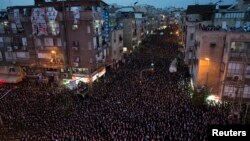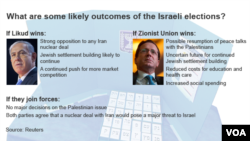Israelis are preparing to go to the polls Tuesday to elect a new parliament. No party is expected to win more than one-fourth of the seats. As a result, the focus is on whether right-wing groups or left-wing parties can win enough votes to form the next coalition government.
Thousands of people rallied Sunday night in Tel Aviv to support a final push by Israeli Prime Minister Benjamin Netanyahu ahead of Tuesday's parliamentary elections.
Opinion polls released Friday - the last day for polling allowed before the election - show the prime minister's Likud party trailing by several seats behind a center-left alliance led by the opposition Labor party.
Netanyahu urged supporters to turn out in force, saying the size of the gap among the parties vying to lead the country can be a decisive factor in who will form the next government.
"This is a fateful struggle; it's a close struggle," he said. "We must close this gap."
Key Players in Israel's March 17 Parliamentary Election
Key Players in Israel's March 17 Parliamentary Election
BENJAMIN NETANYAHU: Popularly known as "Bibi," 65-year-old veteran is seeking fourth term as prime minister as head of right-wing Likud party.
ISAAC HERZOG: Co-leader of center-left Zionist Union, Herzog, 54, is lawyer who has headed Labor Party since 2013.
TZIPI LIVNI: Co-leader of center-left Zionist Union with Isaac Herzog, Livni, 56, served as justice minister and chief peace negotiator with Palestinians.
YAIR LAPID: In 2013 election, his centrist Yesh Atid party came second behind Netanyahu's Likud. Lapid is 51.
NAFTALI BENNETT: 42-year-old far-right Jewish Home party head was 2013 surprise success; advocates annexation of much of occupied West Bank.
AYMAN ODEH: 40-year-old Arab candidate remains obscure to most Jewish Israelis; party he leads, Joint Arab List, is gaining momentum in polls.
MOSHE KAHLON: A former communications minister, Kahlon, 54, formed a new centrist party, Kulanu [All of Us], in January.
AVIGDOR LIEBERMAN: Israel's Moldovan-born foreign minister, 56, leads ultranationalist Yisrael Beiteinu party; it ran jointly with Likud in 2013 election.
Source: Reuters
A center-left alliance led by Labor leader Isaac Herzog has surged in the final days of the campaign.
Herzog told supporters at an earlier rally that after six years of Netanyahu-led governments, it was time for a change.
"We must come together. We must unite and work together to succeed. And we will win because it's either us or him," said Herzog.
Neither Netanyahu's Likud party nor Herzog's Zionist Union alliance is expected to come close to winning the 61-seat majority needed to form the next government.
As a result, both sides are jockeying to attract the support of smaller parties ranging across the political spectrum from communist to orthodox Jewish.
Hebrew University Professor Abraham Diskin noted that 12 percent of voters are undecided, and they could determine the outcome.
"All the right-wing parties combined do not have a majority. All the left-wing parties combined do not have a majority. And in the center we have two parties," said Diskin.
He said two relatively new centrist parties have been gaining ground and could determine which side forms the next government.
For the first time in history, four Arab-led parties have joined forces. The polls indicate their Unity List could win enough seats to make it the third largest party in parliament.
Its leaders say they could back a left-wing government - or in the case of a national-unity government of both the right and the left - they could lead the opposition.





